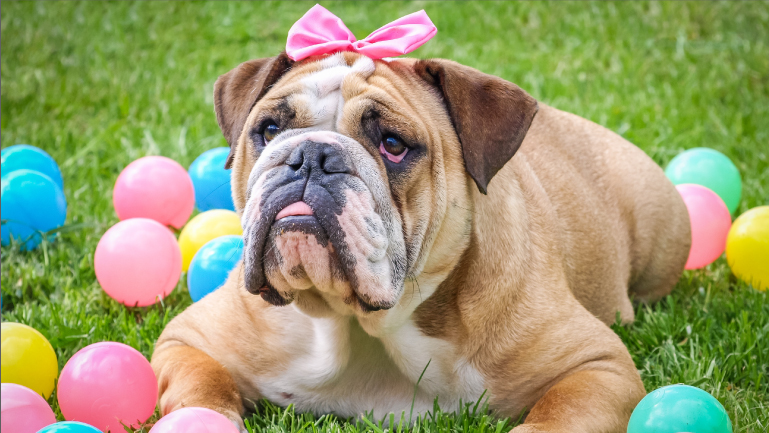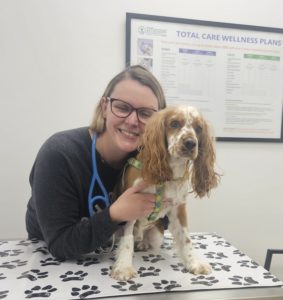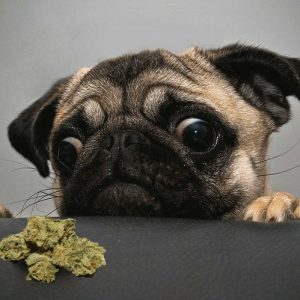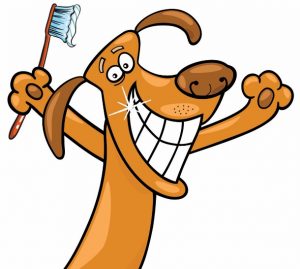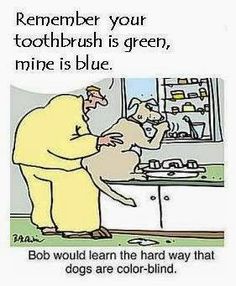Around the Easter holiday, it is important to be eggs-tra careful that your pets are not sticking their noses where they don’t belong. Like most holidays, there are several dangers that accumulate around Easter time. Following the correct safety procedures will ensure that everyone in your family has a comfortable Easter Sunday.
Chocolate (and other candies)
We cannot emphasize this point enough—chocolate and pets do not mix. Chocolate contains caffeine and a chemical compound called theobromine, both of which contribute to chocolate’s high toxicity for dogs.¹ Dark chocolate and unsweetened baking chocolate are especially dangerous for pets, due to their high concentrations of both compounds (known collectively as methylxanthines).² Cats are less likely to scarf down some chocolate since they lack a sweet tooth. However, if they do eat some, they may also suffer the same consequences of chocolate consumption.¹ If you believe your pet has consumed chocolate, or if they’re displaying symptoms such as vomiting or diarrhea, call your vet immediately. They may ask you to bring your pet into the clinic or to induce vomiting at home.
Easter Decorations
The primary danger of this category is plastic Easter grass, or any other Easter basket fillers. When Fido or Kitty looks inside your child’s Easter Basket, the brightly colored, decorative grass lining on the bottom looks like an all too appealing snack. Unbeknownst to Fido, however, plastic is not digestible and can cause serious gastrointestinal blockages if consumed.² This typically results in vomiting, diarrhea, weight loss, lethargy, loss of appetite, pain, and/or bloating. Often these obstructions need to be surgically removed.¹ Play it safe, keep the basket filler away from your pets, or out of the basket completely.
Plants
Easter is Lily season; Lilies are very toxic to cats. Ingesting any part of the lily has been linked to acute kidney failure that can lead to death for our feline friends if not treated quickly.¹ The toxicity of this plant is so severe, that it is recommended to remove them from your home completely if you share your house with a cat of any age. Fake lilies, however, are perfectly safe and make for a lovely Easter decoration.
Easter Feast
Much like Thanksgiving, many families celebrate Easter with a spectacular feast of meat and veggies. Also similar to Thanksgiving, this can pose a threat to any pet who may go digging through the garbage in search of table scraps. Fatty foods, like ham or lamb (or the bones leftover from the meal), can lead to an upset stomach, or even a life threatening case of pancreatitis.¹ Vomiting, bloating, and abdominal pain are common side effects of a pet ingesting these Easter staples. Onions, garlic, chives, and leeks are also toxic to pets and can cause gastroenteritis and hemolytic anemia, and so they should also be kept away from pets.¹
If you think that your pet may have ingested a potentially poisonous substance, call your veterinarian at Total Veterinary Care or the ASPCA Poison Control Center at (888) 426-4435 immediately.
Sites Referenced
- “10 Easter Dangers for Pets.” PetMD, www.petmd.com/dog/slideshows/10-easter-dangers-pets.
- “Top Four Easter Hazards for Pets.” ASPCA, www.aspca.org/news/top-four-easter-hazards-pets

